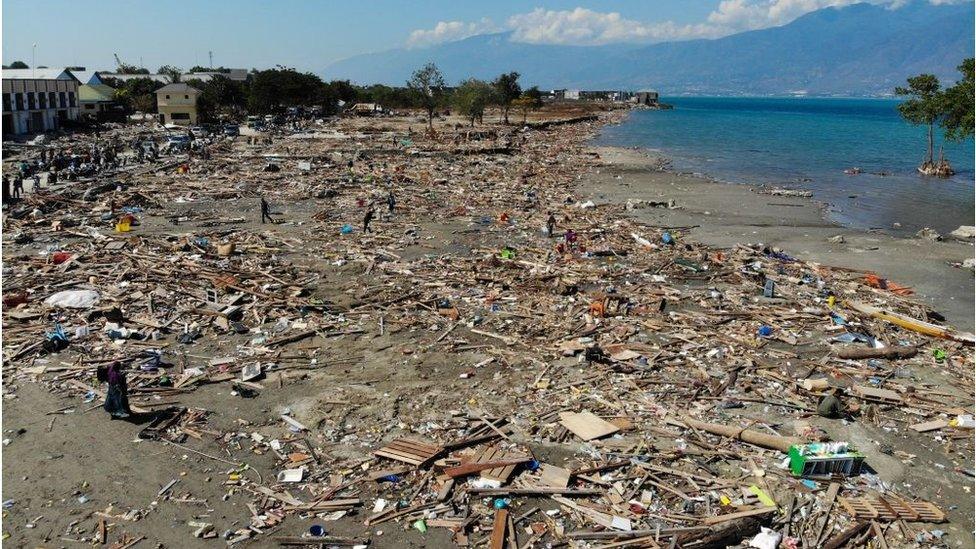Survivors guard rubble of Indonesian tsunami town
- Published

For hundreds of metres stretching away from the ocean is a mass of rubble made up of broken concrete, mashed homes and fishing boats turned upside down. Emanating from this rubble is a stench we could not identify until we went to a medical clinic where bodies were lined up.
The strength of the tsunami that struck after the magnitude 7.5 earthquake hit on Friday is evident not just from the tell-tale stink of death but from the sheer visual scale of the destruction.
Dotted about on top of this rubble are the survivors of a horrifying ordeal: some of them waiting and hoping for relatives to turn up and others just guarding what remains of their homes. We saw one body on top, which people had simply covered with a corrugated iron sheet.
What many have had in common so far is a desire to talk; they want to describe how it happened so quickly, how they lost absolutely everything and in such detail that it comes across as a simple coping mechanism as they sit, powerless.
The people who talked as soon as we got into town said there was no SMS and no alert to warn them what was coming.
One fisherman, who wanted to be known only as Bobi, said that when they saw the water being sucked out into the bay after the strong quake they knew what was coming and so he sent his family and children running to higher ground. He stayed because he saw a child left alone and so he grabbed the child and clung onto him.
But then he was hit by a second wave and that was the wave that destroyed everything. He was thrown by the wave into a mango tree and clung on as the water rushed past and somehow both he and the child survived.
Now he is living a tent amongst the rubble and he says he has received no aid at all and he is angry about that. He broke down into tears when I asked him how he was coping.
Driving through Palu it is clear that the waves decimated to a pulp of debris the small and densely populated fishing communities but left the wealthier, more sturdy, cemented houses largely standing. So there are patches where construction has survived.
Nevertheless the wave was strong - some locals say they saw light wooden boats lifted by the waves, turned upside down and just dumped on the ground. When you look at the long curved bay, with hills in the distance but the town sitting in a flat expanse, it feels like it was a target waiting to be hit.
Experts have pointed to the unique topography of the bay as one that would amplify the effect of even a small tsunami heading in that direction.
The town is now running out of fresh water, food and petrol, and people are queuing for hours to get supplies.
Lying on a stretcher in the dark outside the Mamboro health clinic in Palu we found a five-year-old girl with a broken leg. She was alone, Dr Sasono tells me. "We don't know where her family is and she doesn't remember where she lives." His clinic has no power and is running out of medical supplies.
The tension is palpable. We saw fights breaking out for food and low-level looting and people are beginning to look frightened.
Unless the government gets here with more supplies, there is a risk tensions could spill over.
But for now there is also a definitive community spirit and people are helping each other. This morning, at one hotel, people were waiting to use running water being shared out. People are picking each other up and giving them lifts and so the roads are packed with goodwill travellers.
The men are staying on the rubble to guard their homes and their wives and children have gone to evacuation centres. People are also trying to find out what happened to their relatives, including a journalist travelling with us. Emmy cannot reach her parents and so she has sent her husband to find out.
So Palu is at a precarious turning point with the stink of bodies still buried inside the rubble seeping up into the air, men guarding their smashed properties and survivors searching desperately for relatives.
If the government doesn't come in soon with food, water, power and help, the town could be in line for more pain.